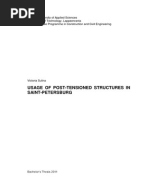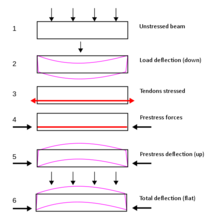Post Tension Institute Manual

- POST-TENSIONING MANUAL, 6TH EDITION [PTI Publications] on Amazon.com. *FREE* shipping on qualifying offers. POST-TENSIONING MANUAL, 6TH.
- Tensioning Institute (PTI) 2nd Edition Manual, which was published in 1996”. It is generally understood by design engineers that friction loss.
Post-Tensioning Tendon Installation and Grouting Manual.
Tendon (cable) tails after tensioning. The cables are pulled to 33,000 pounds, resulting in 8 inches of elongation in a 100-foot cable. Www.avalonstructural.com A residential post-tensioned concrete slab will typically be 8 inches thick and use 3000 psi concrete. Once the concrete has gained strength to 2000 psi, typically within the 3 to 10 days recommended by PTI, the tendons are stressed. Tendons today are seven high-strength steel wires wound together and placed inside a plastic duct. At each end a PT anchor is located and these are located in pockets embedded into the slab edge.
When the strands are stressed, the wires will stretch—about 4 inches for a 50 foot strand—to apply 33,000 pounds of load. Stressing should only be done by qualified workers. After stressing, the tendon is cut off and the pocket in which the anchors are located is filled with grout to protect them from corrosion.
Www.vsl.net Larger structural concrete members may also be post-tensioned, especially in bridges and floors and beams in parking structures. The process is very similar to that used for slabs, except on a bigger scale. One interesting difference is that the tendons will often be 'draped' so that they are low at the midpoint of a beam and high at the supports—this places the steel at the point of highest tension where it can keep the concrete held together tightly. With structural members the duct is often grouted full following stressing to bond the strand to the concrete along its entire length—these are called bonded tendons. Unbonded tendons, used in residential slabs, remain free to move within the duct and are protected from corrosion by grease. PT tendon placement and stressing is usually done by companies with certified workers who specialize in this work.
Decorative Post-Tensioned Concrete Since PT is simply reinforcement, there really aren't any specific decorative applications related to post tensioning. The advantages of PT as noted in the opening page are the lack of cracking (or at least very narrow cracks) and the ability to span farther. PT slabs on ground can be placed and stamped just like with any other concrete slab. Surfaces can be stained or overlaid.
Post Tension Institute Manual
The only concern is to always remember not to cut or drill into post-tensioned concrete slabs, since once a tendon has been cut, it is very difficult to repair. Many post-tensioned slabs will be stamped to alert the owner and any renovation contractors that the slab is post tensioned. This cantilevered golf course green is actually a post-tensioned concrete slab. Suncoast Post-Tension There are two groups offering certification specifically related to post-tensioned concrete construction:. Post Tensioning Institute: PTI has certification programs for manufacturing plants and for individuals:. Manufacturing is certified for Unbonded Single Strand Tendon Fabrication Facilities (about 95% of U.S.

Post Tension Cables
Production is certified under this program) and Prestressed Concrete Strand manufacturing (this is afairly new program-only 6 plants are certified, all in China). Individuals must first be certified as Level 1 (fundamentals), then can go for Level 2 (either as an inspector or as an ironworker for bonded post tensioning installation). A new certification for slab-on-ground installer/stressor is in the planning stages. More information on. Ironworkers Union: Developed by Jim Rogers at Evaluation and Certification Services (publishers of Post Tension Magazine), this program offers two programs, to certify installers of single strand unbonded post-tensioning installers and bonded post-tensioning installers.
Post Tension Institute Design Manual
Rogers says they conducted over 2000 exams in 2007 and are ahead of that pace in 2008.